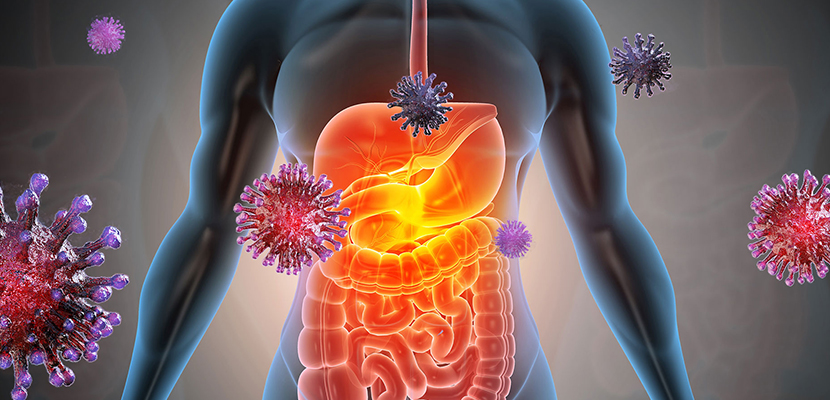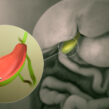The COVID-19 pandemic has taken over all the aspects of human life – the freedom to move around or breathe without a mask, affected businesses – and has accounted for 119,030 lives (as of 26 th October 2020) in India alone. But did you know that COVID-19 can also affect our gastrointestinal health?
Although the coronavirus disease primarily affects the respiratory system, its effects are not limited. It can also have an impact on the digestive tract, let us understand how.
Table Of Contents
- A Brief About COVID 19
- The Link Between the gut and COVID-19
- How COVID-19 Affects the Gastrointestinal Health?
- Summary
- Reach us
A Brief About COVID 19
Coronavirus disease (COVID-19) is an infectious disease caused by a newly discovered virus known as the severe acute respiratory syndrome coronavirus 2 (SARS-Cov-2). The symptoms of this disease are similar to the flu (influenza) or the common cold; the symptoms include cough, fever, shortness of breath, breathing difficulties or pneumonia. Older individuals and people with underlying medical conditions such as diabetes, cardiovascular diseases, chronic respiratory disease, and cancer are more likely to develop the coronavirus disease and its complications.
The coronavirus spreads through the droplets of saliva or nasal discharge, when an infected person coughs or sneezes. To prevent the spread of the virus, respiratory etiquettes should be practised. These include covering your face and mouth, especially while coughing or sneezing, washing hands frequently, not touching your face, maintaining social distance.
Recent reports suggest that the coronavirus not only affects the respiratory system, but also shows effects on other systems of the body, including the gastrointestinal tract.
The Link Between the gut and COVID-19
The gastrointestinal (GI) tract or the digestive system is a long tube that comprises hollow organs including the mouth, esophagus, stomach, small intestine, large intestine, and anus. It also includes the liver, pancreas, and gallbladder. The GI tract moves the food and liquid, breaks them into smaller portions, and absorbs the nutrients obtained.
The gut harbours a wide range of microorganisms that play a crucial role in metabolic processes and providing immunity against the pathogen. Research suggests that the gut microbes also affect the pulmonary health; this action is bidirectional. Hence, if there is any inflammation in the lungs, it can affect the gut microbes. This suggests that the novel SARS-Cov2 might have an impact on the gut microbiota, which can affect the gastrointestinal health.
As the gut microbiota plays a vital role in providing immunity, it can influence immune response in COVID-19, which can impact the disease progression. Both over-active and under active immune responses can lead to serious clinical adverse events.
How COVID-19 Affects the Gastrointestinal Health?
Studies show that individuals with pre-existing gastrointestinal conditions are at a higher risk of developing the condition, as well as to have serious outcome of COVID-19.
A recent report also suggests that SARS-Cov2 RNA can be detected in the stool of COVID-19 patients. However, no fecal transmissions have been reported yet.
COVID-19 can present with some GI symptoms such as loss of appetite (or anorexia), upper-abdominal pain or diarrhea.
COVID-19 interferes with the transportation of nutrients to various parts of the body and makes it difficult for the body to absorb fluid and electrolytes. This can lead to other harmful problems and affects the treatment and the ability to prevent infection. It can also cause liver disease and abnormal liver chemistries.
Individuals who have been diagnosed with ulcerative colitis or Crohn’s disease are more susceptible to the coronavirus disease. Patients with ulcerative colitis or Crohn’s disease are generally treated with steroids which decreases their over-active immune system, thus increasing the risk of COVID-19. Patients with either of the GI condition, who develop COVID-19 may have significantly worsened diarrhea. Developing COVID-19 causes significant physiologic derangement. Hence, it is important to prevent these patients from getting COVID-19.
Although it is still early to conclude, it is predicted that COVID-19 can lead to post-infectious dysmotility, which simply means that after the coronavirus infection, the digestive tract may no longer behave as it did before.
Summary
COVID-19 has impacted the world in every aspect. The coronavirus disease primarily affects the respiratory system, but also affect other systems such as the GI tract. Individuals with GI problems are at an increased risk of developing COVID-19 infection, which can worsen their condition. Studies have also shown the presence of SARS Cov2 RNA in the stool of some patients, but no cases of fecal transmission have been reported yet. As there is a lot to understand about the new virus, it is safe to prevent the spread the infection, especially among people with GI problems and other medical conditions.
Reach us
If you have been diagnosed with any of the gastrointestinal conditions, or if you have any GI symptoms and have symptoms of the coronavirus disease, you can email or call us.
Our specialist, Dr. Parthasarathy is one of the most renowned surgical gastroenterologists in Hyderabad, India. He has about 15 years of experience and has performed 3000+ advanced laparoscopic procedures.



